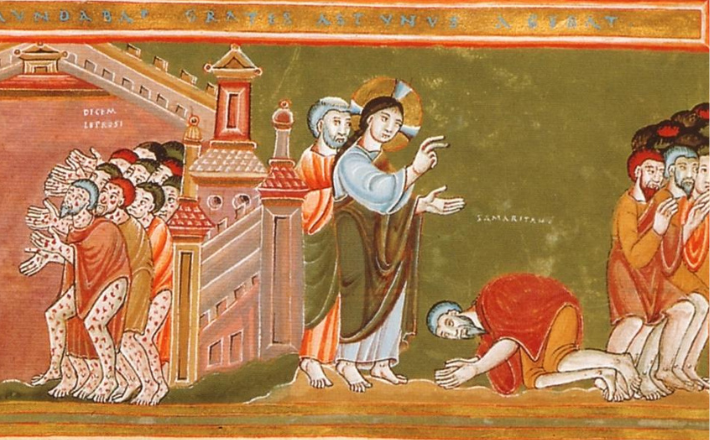Commentary on Jeremiah 29:1, 4-7
As one who speaks the word of the Lord to a contemporary situation, a biblical prophet often must announce what people need to hear, rather than what they might want and prefer to hear. It is quite understandable to want to hear that all is well, that God is “on our side.” However, as early as chapter 6, Jeremiah points to the ultimate harm done by declarations of “peace, peace” when there is, in fact, no real peace (verse 14). Rather than declaring an easy word of such a false peace, Jeremiah announced the profound transgression of God’s people, a stubborn waywardness that, if unaltered, would facilitate the invasion of a hostile foreign power against which resistance would prove futile.
The unpopular word spoken by Jeremiah would earn him ridicule, imprisonment, and even threats to his life. However, the events of 597 BCE would testify to the accuracy of the prophet’s unwelcome warnings as the Babylonian army lay siege to Jerusalem, looted the temple, and carried part of the political and religious aristocracy, including King Jehoiachin (also known as Jeconiah), into exile. Still, some of the same voices of prosperity that had been at odds with Jeremiah all along continued. In Jeremiah 28, the prophet Hananiah declared that the Lord of hosts, the God of Israel, would break the yoke of the king of Babylon and, within two years, return all items taken from the temple and all those taken in exile, including King Jeconiah (verses 1–4).1
Jeremiah’s response to Hananiah’s forecast of imminent restoration shows that he takes no delight in delivering an unpopular word, saying to Hananiah in 28:6, “Amen, may the LORD do so.” Who wouldn’t want to rally and cheer and believe what Hananiah is saying? One could imagine there being a part of Jeremiah that wanted to affirm Hananiah’s proclamation. However, Jeremiah, compelled by the word of the Lord, still cannot affirm a declaration of peace when there is no peace. Should imminent peace materialize, says Jeremiah, then he would be proved wrong. He reiterates, however, that such will not be the case, even prophesying the death of Hananiah because of his deceptive words—a prophecy that, contrary to Hananiah’s, actually does swiftly come to pass.
Chapter 29 begins with the sharing of a letter that Jeremiah sends to the exiles in Babylon. Apparently, there are some among the exiles proclaiming a swift reversal of the looting of the temple and the exile, similar to that espoused by Hananiah. Jeremiah must share with them an unpopular word, similar to that delivered in Jerusalem: Not so fast. Jeremiah delivers the jarring word that the same Lord of hosts, God of Israel, whom Hananiah had invoked to proclaim a swift deliverance from Babylon was actually the God who had sent the exiles to Babylon.2
As Jeremiah’s letter continues, the pleasantness of the news doesn’t improve very much. Still speaking the word of the Lord, Jeremiah lays out a series of imperatives to the exiles, running through the remainder of the pericope: Build houses, live in them, plant gardens, eat of their produce, take wives (for yourselves and your sons), have sons, give daughters in marriage, multiply, seek the welfare of the city and pray for it. Jeremiah even reminds the people with another first-person reference in verse 7 that God sent them into the exile where they now find themselves.
It would seem that no one should aspire to go anywhere anytime soon. In fact, Jeremiah goes on in verse 10 to announce from God a period of 70 years before there will be any remarkable change for the exiles, quite unlike Hananiah’s prediction of two years. The imperatives of verse 7 suggest just such an extended existence in Babylon. The exiles should live lives there in every sense. Not only should they settle in and establish lives for themselves; they should also seek the welfare of Babylon—even pray for it!
Although this is almost certainly not what any among the exiles in Babylon wanted to hear, it was what they needed to hear. False prophecies by self-interested pseudo-prophets who had told the people over and over that all was well, when in fact very little was well, were a major factor in landing the people in exile in the first place. Additional smooth but empty words would not be helpful. By announcing a word from God that may sound harsh and hopeless, Jeremiah is actually planting seeds for a hope that is reliable and a restoration that is real.
In verse 11, immediately after the announcement of the 70-year duration of the exile, come some of the most memorable and hope-filled words in the entire book: “For surely I know the plans I have for you, says the LORD, plans for your welfare and not for harm, to give you a future with hope.”3
Several lessons for the exiles here are lessons for us moderns as well, especially when we find ourselves in the midst of some—often self-imposed—experience of exile. To begin, quick fixes are rarely fixes at all; they’re almost never deep and enduring. A friend of mine recently told me, only half-jokingly, that microwaves had contributed to the ruination of the world. They condition us, he suggested, to expect that everything in life comes with the ease of the push of a button and within a very short time. TV dinners may be that way, but most things are not.
Herein lies good news because for us, as for the Babylonian exiles, God is with God’s people for the long haul, even when the extended length is largely due to how far we have veered off the path. Thank God this is the case, especially when what is needed may be a full engine overhaul rather than just an oil change!
We also should not assume that God has forsaken us or bears ultimate ill will for us when circumstances are not to our liking. It took a while for God’s promise of seed to Abram and Sarai to come to fruition, but it did. The Hebrews spent more than a few days in slavery in Egypt, but God freed them. Some of those same Hebrews ended up wandering in the wilderness for 40 years, but their descendants made it to the Promised Land. The Babylonians took many into exile and ultimately destroyed the temple in Jerusalem, but a return would happen and the temple would be rebuilt.4 When it seems all is lost, or far-distant at best, it may be a time in which God is most powerfully at work and a remarkable new thing lies in store.5
Among the most jarring of imperatives to the exiles in the assigned pericope may be those to seek the welfare of Babylon and pray to the Lord on its behalf. That had to be a hard one to swallow. Yet, again, while it was not what the people wanted to hear, it was what they needed to hear. Particularly since the exiles were going to be there for a while, if Babylon prospered, so too could they in the lives they were called to establish. Additionally, these imperatives are an indication of good news, which Jeremiah spells out in verse 11.
If God did not have plans for the people, plans for their welfare and for a future with hope, it would not have mattered what they did in their time in Babylon. But since God did have those plans, what the people did in Babylon mattered, and mattered greatly.6
Furthermore, recent and current events in our modern world testify loudly to the destructive results that follow when we work for the harm of and verbally malign other persons, groups, or places, rather than seeking their welfare and praying to the Lord on their behalf. To this day, the words we want to hear may not be the words God speaks to us—those sometimes difficult but promise-filled words that we desperately need to hear.
Notes
- Particularly by invoking God as “the Lord of hosts,” Hananiah presumes that God would obviously act powerfully and decisively against Babylon just as God did against Egypt. Ironically, it is actually God who has brought the Babylonian military might against God’s people, and the temple to which Hananiah said articles would be swiftly returned would not be standing by 587 BCE.
- “Thus says the LORD of hosts, the God of Israel, to all the exiles whom I have sent into exile from Jerusalem to Babylon…” (verse 4, emphasis added).
- Then, of course, come chapters 30 and 31, known as the Book of Consolation, where words of future hope and renewal continue to develop.
- Incidentally, in large part due to another non-Israelite power whose ruler (Cyrus) is referred to as God’s anointed (that is, messiah). See Isaiah 45:1.
- As in the death and resurrection of Christ.
- In fact, a Jewish community would become firmly established in Babylon, arguably contributing to the city’s welfare. The Jewish community in Babylon would become one of the great centers of Jewish thought and learning, as indicated, for instance, by the production of the Babylonian Talmud.


October 12, 2025